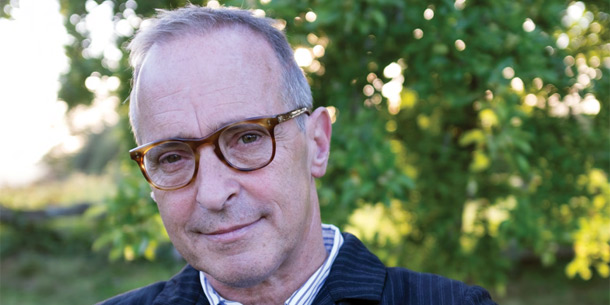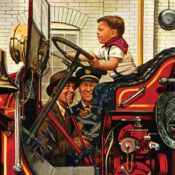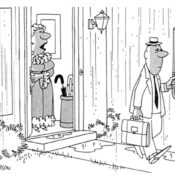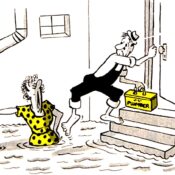
What makes us laugh, and why? Philosophers and scientists have been trying to crack the code for millennia. Yet, who knows funny better than the writers who create it?
The Post invited David Sedaris to share his thoughts on what makes him laugh. (We also interviewed other prominent humorists. See “Humorists on Humor”).
A master of satire, David Sedaris has made a career out of transforming the facts of his own life and family quirks into laugh-out-loud essays and prose. A regular contributor to NPR’s This American Life, Sedaris has been compared to literary giants Mark Twain, James Thurber, and Dorothy Parker. The author of 10 bestsellers, including Let’s Explore Diabetes with Owls and most recently Theft by Finding, shares a unique encounter with socialized medicine in his essay “Dentists Without Borders” and his take on contemporary humor.
Pat Perry: Where does humor come from in your own writing?
David Sedaris: I come from a big family, and all the kids in it are funny in a different way. My sister Amy and my brother Paul are incredibly fast on their feet. Their humor is in the moment. I, for some reason, prefer to chew on the past. My sister Lisa is the same. I love her stories. What makes Gretchen funny is her weird timing, and the shocking things that she says. My late sister, Tiffany, was funny as well. We’re not competitive; rather, we just appreciate each other. No one makes me laugh like my family. I use humor in my writing because I want the audience to make a noise, and laughter beats the sound of people vomiting or having babies in the dark.
PP: What are your thoughts about the, for lack of a better term, politically correct moment we’re in and the relationship between humor and public sensibilities? Is it stifling humor writing?
DS: After a London reading last year, a woman handed the theater manager a slip of paper. “Here’s my address,” she told him. “He’ll need it when sending me an apology letter.”
“Did she mention what I’d done to offend her?” I asked.
It’s so hard to tell what might set people off anymore. I’m gay, so am spared charges of being heteronormative.
A woman approached me at the book signing table a few years back and said, “Question: Do you think you could maybe write one single story in which an animal isn’t being tortured?”
(I hate it when people begin sentences with “Question:”.)
“After a London reading last year, a woman handed the theater manager a slip of paper. ‘Here’s my address. He’ll need it when sending me an apology letter.’”
—David Sedaris
“Did I mention a lot of animals being tortured tonight?” I asked a 70-year-old a few minutes later.
“Well,” she said, and she thought for a moment. “There was that one mouse.”
What really gets people going is race, which is almost impossible to talk about in America. If I have a black character in an essay who is any less virtuous than Morgan Freeman in every movie he’s ever been in, the audience — the whites in the audience — retreat into their own heads and stay there, thinking, If I laugh, does it make me a racist? What does it mean that I don’t like this particular character?
That said, I don’t feel particularly stifled. I just do my thing.
PP: Would you say the American sense of humor is different from that of other countries, other cultures?
DS: A few years back, a group of Italian horn players adapted a number of my stories for the stage. It was all very madcap and physical — at one point a tuba acted as a toilet. I can’t imagine that kind of broad, almost infantile theater working in, say, Greece or the U.S., but it killed in Turin. I see differences between the U.S. and the U.K. I think the British are better at wordplay than we are, more appreciative of it. I can’t speak for France. My books come out there, but nobody buys them. The reviews are like, “What is this? A person wrote a story about their dentist, but why?” I’ve never understood the stereotype of the humorless German. I love doing shows there.
PP: What trends do you see in current American humor? Any you like? Any you don’t?
DS: I like that our society has opened up. Cable TV and podcasting are giving more people a chance to be heard. As for trends, you’re talking to someone who just yesterday noticed that people are wearing skinny jeans. And it’s been, what, eight years now?
This article, along with David Sedaris’ essay, “Dentists without Borders,” was featured in the September/October 2017 issue of The Saturday Evening Post. Subscribe to the magazine for more art, inspiring stories, fiction, humor, and features from our archives.
Become a Saturday Evening Post member and enjoy unlimited access. Subscribe now




Comments
Great reading!!!!! I really enjoy hearing him on tv. He has his own style of
humor but always funny and always clever. KEEP IT UP.